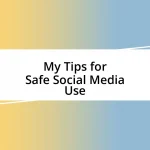Key takeaways:
- Online identity theft is a growing concern, with risks arising from oversharing personal information and evolving phishing tactics.
- Recognizing signs of identity theft, such as unexplained charges and unfamiliar accounts, is crucial for early intervention and protection.
- Utilizing resources like the FTC, identity theft protection services, and local consumer protection offices can aid in recovery, while proactive measures like strong passwords and two-factor authentication enhance ongoing safety.

Understanding online identity theft risks
Online identity theft risks can feel overwhelming, especially considering how much of our lives are now lived online. For instance, I remember a friend sharing her anxiety after realizing her social media profiles had been hacked. It’s a sobering reminder of how easily someone can manipulate our information and tarnish our reputation, isn’t it?
One of the most insidious aspects of identity theft is its ability to creep into our everyday interactions. Imagine receiving an email that looks legitimate, only to discover later that it was a cleverly disguised phishing attempt. This experience highlights how identity thieves are constantly evolving, preying on our trust and leading us down paths that can have devastating consequences. Isn’t it alarming how something as simple as an innocent click can lead to such serious risks?
As I reflect on these risks, I’m reminded that the digital landscape can be both a playground and a minefield. I often think about the potential impact of sharing too much personal information online. Have you ever considered what details might be used against you? From name and address to seemingly benign likes on social media, everything we post can be a double-edged sword in the hands of a skilled identity thief. Understanding these risks is crucial for protecting ourselves in this digital age.

Recognizing signs of identity theft
Recognizing the signs of identity theft is crucial, yet it often goes unnoticed until it’s too late. I recall a tense moment when I noticed strange transactions on my credit card statement. It felt like a punch to the gut; the realization that my financial security was compromised sparked immediate action on my part. If you’re vigilant, you might pick up on these signs before things escalate.
Here are some common indicators that you might be facing identity theft:
– Unexplained charges on bank or credit card statements.
– Received bills or collection notices for unfamiliar accounts.
– Missing mail or unexpected changes in address.
– Failed attempts to access accounts due to incorrect passwords.
– Credit reports showing unfamiliar accounts or inquiries.
These occurrences can create a wave of anxiety, and recognizing them early can make all the difference in stopping identity theft in its tracks. Remembering that gut feeling when something seems off might just save you from a longer-lasting headache.

Resources for identity theft recovery
When it comes to recovering from identity theft, having access to the right resources can make a significant difference. I once had to navigate this challenging process after discovering my information had been compromised. I found the Federal Trade Commission (FTC) website to be an invaluable tool. It offers a detailed step-by-step recovery plan and a wealth of information on how to report identity theft, which really helped me regain my footing.
There are also various identity theft protection services available. During my recovery, I tried one that provided continual monitoring and alerts for any suspicious activity linked to my personal information. This extra layer of security gave me peace of mind. I remember thinking about how it felt to be in control again, knowing I had support during such a frightening time.
If you’re in the unfortunate position of dealing with identity theft, I encourage you to explore local resources too. Many communities have consumer protection offices that offer free assistance and guidance. It’s comforting to know that help is just a call away, especially when you feel overwhelmed. I’m curious, have you reached out to any local organizations for assistance in troubling times? This personal touch can really aid in navigating the recovery journey.
| Resource | Description |
|---|---|
| Federal Trade Commission (FTC) | Offers information and recovery steps for identity theft victims. |
| Identity Theft Protection Services | Provides monitoring and alerts for suspicious activities related to personal information. |
| Local Consumer Protection Offices | Can offer free assistance and resources tailored to your community. |

Tips for ongoing online safety
When it comes to ongoing online safety, I can’t stress enough the importance of strong, unique passwords for every account. I learned this the hard way when I noticed that my password manager was filled with repetitive passwords. After one account was breached, I felt an overwhelming fear of what could happen next. Switching to complex and varied passwords not only boosted my security but also gave me a sense of control over my online world. Have you ever thought about changing your passwords regularly? It can be a simple way to protect yourself.
Additionally, I’ve found that two-factor authentication (2FA) adds a robust layer of defense that’s hard for cybercriminals to penetrate. I remember the day I activated 2FA on my email account. The feeling of added security was immediate and reassuring. It’s a bit inconvenient at times, but when you consider the potential fallout from identity theft, isn’t that small effort worth it? Having to verify my identity through a secondary method makes me feel like I’m taking charge of my safety.
Lastly, staying informed about the latest scams and tactics used by identity thieves helps me remain vigilant. I frequently visit cybersecurity websites and listen to podcasts that discuss current threats. Once, I stumbled upon a podcast episode that warned about phishing emails masquerading as legitimate accounts. It made me think twice the next time I received a suspicious email. How often do you educate yourself about online safety? Being proactive can truly make a difference in protecting your identity.














